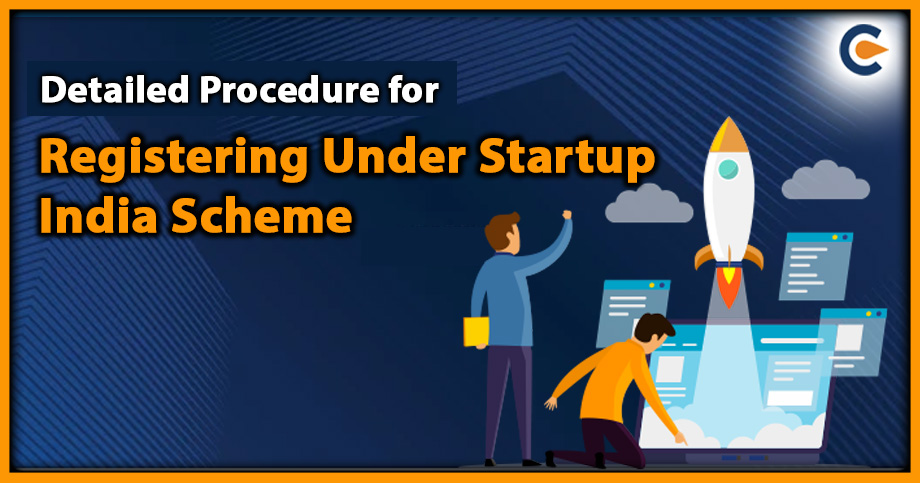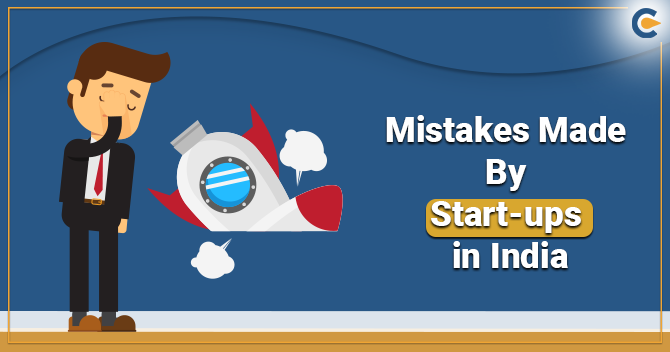Startup India Scheme is a government effort in India that aims to create a robust ecosystem for fostering innovation and entrepreneurs in the nation in order to foster long-term economic growth and create numerous job opportunities. The government wants to empower startups to develop through innovation and design through this initiative.
Goals of Startup India Scheme
The Startup India Scheme’s goals are listed below. The action plan includes assisting startups among other things:
- Improved infrastructure, such as incubators.
- Facilitation of IPR, including simplified patent application.
- The improved regulatory environment, which includes tax advantages, simpler compliance, faster company formation, quickest process, and more.
- An objective to improve funding possibilities.
- Provide the startup ecosystem’s players with access to a sizable networking database.
What Is A Start Up?
A startup is a freshly established, mostly small business that is launched by a single person or group of people. A startup delivers a different good or service that isn’t provided somewhere similarly, which distinguishes it from other young businesses. Development of innovation is the driving force.
Any business that meets the criteria below falls under the startup category and is qualified to use DPIIT:
Company’s Age
The company’s incorporation date shouldn’t be more than ten years ago.
Type of Business
Either your business is registered as a Private Limited Company under the Companies Act of 2013, a Partnership Firm under the Indian Partnership Act of 1932, or a Limited Liability Partnership (LLP) under the Limited Liability Partnership Act of 2008.
Turnover Limit
Since its establishment, the company should not have had an annual turnover greater than Rs. 100 crore for any of the financial years.
A New Commercial Entity
The company must be brand-new; it cannot be the outcome of a split or reorganisation of an existing company.
Friendly to Innovation
The company should be focused on innovation, the creation of brand-new goods or services, or the improvement of already-existing ones. The company plan should have a great potential for wealth creation and job creation.
Certificate for DIPP
It is basically necessary to obtain a certificate from the Inter-Ministerial Board; the Board was established by the DIPP. (Department of Industrial Policy and Promotion).
Startup India Scheme Initiative
In order to encourage the expansion of startups in India, the Indian government has launched a programme called Startup India, which is being led by Prime Minister Narendra Modi[1]. On January 16, 2016, the initiative was unveiled in New Delhi. We’ll look at which businesses in India qualify as startups now that you know what a startup is and what Startup India Scheme is all about.
Eligibility Criteria for Startup India Scheme Registration
For the startup to be eligible for the DPIIT Certificate of Recognition, it must meet the following requirements:
Duration of Entity
From the date of establishment, the company’s existence and operations cannot last longer than 10 years.
Type of Entity
Companies that are incorporated as Private Limited Companies, Limited Liability Partnerships, or Registered Partnership Firms are eligible to get the DPIIT Certificate of Recognition.
Annual Turnover
The company must have an annual turnover of Rs. 100 crore for any of the fiscal years since its formation in order to receive the DPIIT Certificate of Recognition.
Original Entity
The company should not have been formed by dividing up or creating a new entity in order to qualify for the DPIIT Certificate of Recognition.
Innovative and Scalable Entity
The organisation must be working to develop or improve a good, process, or service. Also, the organisation should have a scalable business plan with excellent employment and income generating potential. The business should be able to increase wealth or employment.
Advantages of the Startup India Scheme Registration
The Startup India Scheme Registration has the following advantages:
Income Tax Advantages
Startups are now exempt from paying income tax for three years following the date of incorporation, if the Inter-Ministerial Board of Certification certifies them as such. Additionally, the startup will be exempt from capital gains tax under Section 56 of the Income-tax Act, 1961-2014 after receiving recognition from the Department for Promotion of Industry and Internal Trade (DPIIT) and if the total amount of paid-up share capital and share premium of the startup after the proposed issuing of shares, if any, does not exceed $25 crore.
Financial Advantages
Startups receive an 80 percent refund on patent IPR expenses and a 50 percent rebate on trademark IPR costs from the government, and these facilitators actively help startups protect and commercialise their IPRs. The IPR application review and decision-making processes are also expedited. The facilitators’ fees will also be covered by the government.
Benefits of Registration
Due to the stringent criteria, Startup India Scheme Registration is still incredibly complicated, with incorporation and registration being seen as being more challenging than actually operating a business. The plan offers a portal to foster networking opportunities and support for companies. Under the program, a problem-solving window has been made available by the government.
Link Networks
Startup has the advantage of assisting businesses in network development and connection search. In order to obtain mentorship, these startup enterprises look for various large corporations and interact with them. For start-up businesses, relationships with investors and industries are quite beneficial.
Self-Certification
Startups can self-certify their compliance with nine environmental rules and a variety of labour standards.
Rebate When Filing a Patent
Startups registered under the Startup India Scheme Registration would receive an 80% discount when filing for patents.
Business Possibility
Startup India is a platform that provides all start-ups with numerous possibilities, recognition, and help while they struggle to find their market.
Funding Advantages
Startups accredited under the programme may receive seed investment from some states. to be aware of your state’s laws and standards.
Regulatory Advantages
Under this program, entrepreneurs are permitted to easily self-certify compliance with six labour regulations and three environmental laws. No inspections of labour laws will be carried out for a period of five years unless a credible and verifiable complaint of a violation has been made, submitted in writing, and approved by a representative who is at least one level above the inspecting officer.
Startups that fit under the “white category” (as the central pollution control board defines it) for environmental rules would be permitted to self-certify compliance, and only sporadic checks would be made in such cases.
Benefits of Public Procurement
You can register as a seller on the Government of India’s e-procurement portal, the Government e-Marketplace, and gain access to all Government of India Ministries/Departments/Public Sector undertakings once your startup has received certification from the Inter-Ministerial Board of Certification and a DIPP (Department of Industrial Policy and Promotion) number has been issued to you. This is subject to your ability to meet quality and technical requirements. Additionally, certified startups will be entitled to exemptions from the requirements for prior turnover and experience, as well as the earnest money deposit in your offer.
Faster Exit Advantages
By hiring an insolvency professional to expedite the closure of operations, enable the sale of products and the payment of creditors, all while recognising limited liability, the government has introduced regulations that make winding down operations easier. Startups with a straightforward debt structure or those that satisfy the requirements listed under this programme will be able to execute their exit within 90 days.
Startup India Scheme Registration Process
Step 1: Register Your Company as a Corporation
The first step is to incorporate your company as a Limited Liability Partnership, a Private Limited Company, or a Partnership firm. To obtain registration, you only need to follow the standard procedure, which includes filling out a form.
Step 2: Sign up with Startup India
You must now register your business or enterprise as a startup under the government’s Startup India programme. Simply fill out the form that is provided for you on the Startup India website. You must enter all the required information and upload a predetermined number of documents.
Step 3: You Can Only Upload Documents in PDF Format
A recommendation letter is required in addition to the registration form. You can request any of the letters of recommendation listed below.
- A letter of recommendation from an incubator that is well-known in an Indian post-graduate institution, in a format accepted by the DIPP. This relates to the business’s innovative nature.
- A letter of reference from an incubator that has received funding from the Indian government as part of a specific programme to encourage innovation.
- A letter in DIPP format from any of the incubators recognised by the Indian government.
- A letter endorsing the creative character of a business that commits not less than 20% of its equity and is signed by an incubator fund, private equity fund, angel fund, accelerator fund, or private equity fund registered with SEBI.
- A recommendation made later by the Indian State or Central governments.
- A patent that has been submitted and published in the Indian Patent Office Journal in fields related to the type of business being promoted.
- The incorporation certificate for your business, LLP, or registration certificate for a partnership entity must be uploaded.
Step 4: You Must State Whether You Require a Tax Exemption
For the first three years, startups in India are exempt from paying income tax, but in order to take advantage of these benefits, the business must be certified by the Inter-Ministerial Board. (IMB). Companies who have registered with DIPP are given some leeway in this situation because doing so is sufficient to receive the benefits.
Step 5: Self-Certify the Subsequent Conditions
- You are a partnership firm, an LLP, or a private limited company.
- Not earlier than five years must pass since your company was founded or registered in India.
- The annual turnover of your business cannot exceed Rs 100 crore.
- The business must continually develop new ideas or find new ways to improve the current system.
- Your company must be an original concept, not a division or reconstruction of an existing company.
Step 6: Obtain Your Recognition Number
You will immediately receive a recognition number after submitting this registration. After the authority has reviewed all of your uploaded documents, only then do you receive the certificate of registration or incorporation.
You must be careful when submitting the data because any inaccuracy could result in severe penalties of up to 50% of your paid-up capital, or at the very least, Rs 25,000.
How Can I Know Whether My Registration Was Successful?
Once the system has confirmed your startup and accepted your application, you will receive a certificate of recognition. You can get in touch with the certificate for nothing on the Startup India website.
Increasing numbers of people are starting their own businesses as a result of federal tax breaks, financial assistance, and other measures. The majority of businesses are founded and run by young people, which is the most exciting aspect and speaks volumes about India’s enormous pool of creative talent.
Few people put their whole heart and soul into it because they had to accomplish everything on their own at the time without government aid. However, since the programme’s inception, people have become more confident in their abilities because they know that the government will support them at every step of the way. As a result, they are creating fresh concepts.
What Advantages Does DPIIT Offer?
The next step after creating a profile on the Startup India website is to apply for the Department for Promotion of Industry and Internal Trade recognition. (DPIIT). This recognition enables startups to take advantage of benefits such as easy company winding, the benefit of self-certification under environmental and labour laws, and a relaxation of the requirements for public procurement, accessibility to funding, tax exemption for three years in a row, and tax exemption on investments that exceed fair market value.
The following advantages offered by the Startup India Registration Scheme are available to DPIIT registered companies:
Simplifying and Supporting
Legal support has also been doable and easy thanks to considerably easier compliance and a method for exiting for failed start-ups.
Funding and Rewards
In addition to providing an exemption from income tax and capital gains tax, funds are also collected to inject new cash into the firm.
Partnership between Industry and Academic Incubation
There are ever more incubators, creative laboratories, events, competitions, and grants.
Conclusion
Every prospective business owner should be aware of a few legal aspects related to business owners before beginning. Whether a private limited company, a sole proprietorship, or another sort of corporation is starting the business, it starts with being aware of the type of business being launched and who is doing so. Due to numerous government programs, registering a new firm is very simple. To draw attention to your endeavour, you can want to concentrate on your main area of expertise while starting your organisation.
Read Our Article: Process Of Startup India Registration: A Step By Step Guide











